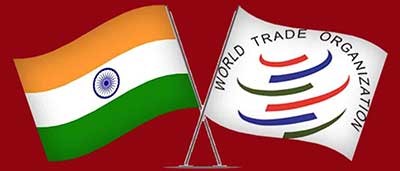Free Courses Sale ends Soon, Get It Now


Free Courses Sale ends Soon, Get It Now


 Disclaimer: Copyright infringement not intended.
Disclaimer: Copyright infringement not intended.
Introduction
Background
Ruling
What the WTO Said
India’s stance
Repercussions
Note: MPIA is an alternative system for resolving WTO disputes that are appealed by a member nation in the absence of a functioning WTO appellate body.
Implications
IMPORTANT ARTICLES ON WTO:
https://www.iasgyan.in/daily-current-affairs/wto
https://www.iasgyan.in/daily-current-affairs/wto-agrcultural-subsidies
https://www.iasgyan.in/daily-current-affairs/rules-of-origin
|
RULES-BASED TRADE The World Trade Organization (WTO) deals with the global rules of trade between nations. Its main function is to ensure that trade flows as smoothly, predictably and freely as possible. At the heart of the organization are the WTO agreements, negotiated and signed by the bulk of the world’s trading nations. These documents provide the legal ground-rules for international commerce. They are essentially contracts, binding governments to keep their trade policies within agreed limits. Trade within the framework of the WTO agreements is described as “rules-based”, meaning it is a system based on rules. A rules-based trading system ensures that individuals, businesses and governments know what the trade rules are around the world. It gives them the confidence to do business under stable predictable conditions. What are the WTO rules about? The WTO agreements cover goods, services and intellectual property.
|
Criticisms of WTO
Reform Proposals
Closing Remarks
|
PRACTICE QUESTION Q. There is an urgent need for “strengthening the multilateral character of the WTO, especially through the preservation of the practice of decision-making by consensus. Comment. |
© 2024 iasgyan. All right reserved